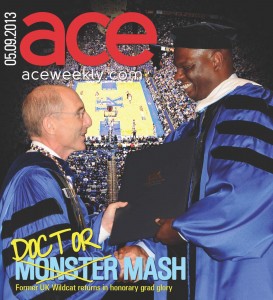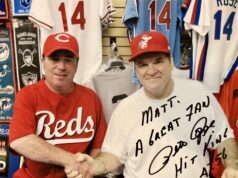[three_fifth]
BY KAKIE URCH
 I had a better view of Jamal Mashburn against LSU with Shaquille O’Neal from Section 16 in Rupp Arena in 1991 than I did from the faculty seats Sunday night at UK Commencement, where Mashburn received an honorary doctorate of humanities.
I had a better view of Jamal Mashburn against LSU with Shaquille O’Neal from Section 16 in Rupp Arena in 1991 than I did from the faculty seats Sunday night at UK Commencement, where Mashburn received an honorary doctorate of humanities.
But Mashburn’s personal experience at Kentucky from 1990-1993 gave me an early glimpse of the view we now have of this remarkable man from the Bronx who has made Kentucky proud and made it his own since he took the risk of coming here to play for a program down on its luck (hell, we were down to 3 scholarships) with a brash new coach from Providence named Pitino.
Now I am not what we call, in Kentucky, a basketball fan. A true fan has, or has had, at some point in his or her life, the UK wallpaper. By this measure, I have cousins who are basketball fans. I have cousins who are children of those cousins who are basketball fans. I have an uncle who has built a whole lot of roads and bridges across the Commonwealth but no project was done with more care than his two equally impressive mancaves that are shrines to the Wildcats, complete with the wallpaper. They have season tickets. And they are — by the wallpaper test — basketball fans.
So, what am I, not really a “basketball fan,” just some odd graduate student in English, doing sitting in Section 16 in 1991? The point is, in 1991, those seats were AVAILABLE. For free and at the last minute and folks like me were like, sure, basketball game, I’ll go. I went to nearly every home game in 1991 and 1992, when Mashburn played his heart out for University of Kentucky.
The Wildcats had been slapped with three years’ probation, a two-year ban from postseason play and a ban from live television in 1989–90. The coach and AD were fired. The “death penalty” was avoided by the width of a matted hair of the mascot’s suit and the neck of a fine university president, who also departed.
New coach Rick Pitino offered one of the three scholarships to Jamal Mashburn, Mr. Basketball for the state of New York for 1990. And Mashburn said “Yes.” And then for the next years, he was the big man (at 6′ 8″) who teamed up with the indefatigable Coach Pitino and the remaining “Unforgettables” to fireman’s carry the program from TV ban in 1990 up 20 flights of stairs to the Final Four versus Michigan in 1993. And that, Christian Laettner aside, should be enough.
 Help save the program. Be a three-and-done player. Have a killer fade haircut. Be named All-SEC and All-American, All-NCAA Final Four, be drafted No. 4 to Dallas. You’ve done right by us, #24, thanks and here’s a cigar. You’re our legend. You could just bomb in the NBA, because we don’t really care about those stats. The pinnacle is here in Rupp, and you’ve reached it. But Mashburn goes on to a record-setting and long-lived NBA career, followed by a long stint as a well-regarded ESPN on-air analyst. (More difficult than it looks, if you’re doing it right, as my multimedia students can attest.) And that would be enough.
Help save the program. Be a three-and-done player. Have a killer fade haircut. Be named All-SEC and All-American, All-NCAA Final Four, be drafted No. 4 to Dallas. You’ve done right by us, #24, thanks and here’s a cigar. You’re our legend. You could just bomb in the NBA, because we don’t really care about those stats. The pinnacle is here in Rupp, and you’ve reached it. But Mashburn goes on to a record-setting and long-lived NBA career, followed by a long stint as a well-regarded ESPN on-air analyst. (More difficult than it looks, if you’re doing it right, as my multimedia students can attest.) And that would be enough.
But as those attending Commencement on Sunday learned, if they didn’t already know, Mr. Jamal Mashburn, in coming from the Bronx to a place as different as it could be from the five boroughs of New York, brought with him, developed, burnished and has for 20 years lived the qualities that UK as an institution calls its “Kentucky Promise.”
Before he played one game in the NBA, Mashburn endowed $500,000 for a scholarship program that to this day, identifies students in the 9th grade in Fayette County schools and offers them a scholarship to UK or Bluegrass Community and Technical College, while nurturing them to excellence. Mashburn’s foundations do work with latch-key children, children of single mothers and children of alcoholics.
He was recently featured in an ESPN documentary called “Broke,” held up as an example of a professional sports player who had turned the brief largesse of the game into an investment on a viable and thriving business. Planning to create financial stability for himself through business from early days, Mashburn now owns 38 Outback Steakhouses, 40 Papa John’s restaurants, three Dunkin Donuts stores, including the one on Main Street in Lexington, Toyota on Nicholasville and Lexus of Lexington. The Outback and Papa John’s franchises were started by Kentuckians and several of Mashburn’s businesses, by doing their retail business in the Commonwealth, contribute heartily to the state’s economy.
In that LSU game, Mashburn played only 14 minutes and got 5 points, low for him. But in March of that 1991 season, the Wildcats, with Jamal Mashburn, beat Auburn 114-93 to claim the SEC title as two years of probation ended. I watched that from Section 16, too, electrified.
It is true, as past and current coaches say as they criss-cross the country talking to recruits, that the University of Kentucky Men’s Basketball program has a lot — maybe the most — to offer. But Jamal Mashburn is one player who has given back far more to the University and the Commonwealth than he has taken away.
We’ve awarded him a much-deserved honorary doctorate of humanities, which makes us a little closer to even. 18-year-old Jamal Mashburn was a thing of joy to watch on the basketball court, but it’s the 43-year-old Jamal Mashburns that mark the true goal of the University of Kentucky.
Kakie Urch is an assistant professor of multimedia in the School of Journalism and Telecommunications at the University of Kentucky.
This article appears on page 6 of the May 9 print edition of Ace.
[/three_fifth]
[two_fifth_last]
Thanks for the Memories, Mash
by Tread
If you are a Kentucky basketball fan of a certain age, an age that allows you the terrible, horrible memory of the 1988 NCAA investigation of the UK program. $1,000 in an Emery Air Freight envelope meant for recruit Chris Mills, sent by Eddie Sutton’s assistant, Dwane Casey ended up shining a bright light on the dark side of college athletics as accusations that Casey was a symptom of a problem that included boosters in blue blazers gifting players a little pocket money and at least one player allegedly cheating on his ACT. Dark, dark days, indeed. Within weeks every set of lips in town were wet with stories of Coach Sutton’s problem with the bottle, cash being tossed about like $1 hot dog night at Cowboys and the improbability of surviving the sentence sure to be delivered from the high court of the NCAA. An example, we would be made. And we were, 3 years, probation, Sutton resigning in disgrace, Chris Mills in a wildcat uniform…in Arizona.
Fast forward, to 1992, Rick Pitino, an NYC carpetbagger has not only ignited the faithful with a brand of brash NYC city style basketball, all full-court pressure and in your face offensive prowess he has this team of post-probates competing at the highest level. And it’s no mistake that the team is being led by a sophomore fellow NYCer. But not cut from the same cloth as his coach, Jamal Mashburn, a big (6’8, 240-pounder) but quiet kid, more smile than furrowed brow intensity, Mashburn was the Yin to Pitino’s Yang. The son of an NYPD cop and boxer father and high school sprinter mother, he was a nice mix of both. Size, speed, fight and finesse. A New York recruiting guru at the time described Mashburn as having “the body of a blacksmith and the touch of a surgeon.” But it wasn’t until his high school coach got out of the way and let Mashburn invent his own position on the floor—Point center. But even with a NYC high championship trophy on the shelf and the title Mr. Basketball in the state of New York, he was still seen as a little lazy and a kid with a ton of potential still unrealized. It shouldn’t go unmentioned that Pitino’s success with what some described as scrubs with the leftovers at UK during the three probations years had earned him the reputation for getting the most out of those who played for him. A reputation he still exhibits. When Mashburn chose Kentucky, a rival NYC high coach emoted, “it’s like giving an atomic bomb to a terrorist…” He was right.

Jamal Mashburn, won us over that season slowly, solidly. Not with flash, or ball-hoggedness. Quite the opposite really, I begged at the TV for him to shoot more, take it to the rim more, pull-up and pop more. Eventually so did his coach. An innate rebounder and a master of simply the pull-up and pop, he could control a game with an ease of the masters of Kentucky lore. Dan Issel, Kyle Macy, Jack Givens, Jamal Mashburn…my Mt. Rushmore. But I didn’t know that quite yet because for all the fun and frolic of 1992 and the emergence of a true superstar in blue and white we ended that Spring, with Monster Mash on the bench, watching the scum of the earth Christian Laettner pound a death nail into the hearts of every Kentuckian far and wide with “the shot” that barred the Cats from a Final Four appearance.
Come 1993, Monster Mash was a pre-season All-everything. Consensus super-human, we all knew he would be gone to the NBA, and rightfully so, he was just that damned good. He had gotten us back. We were relevant, again. Top quality players wanted to play here and we had gone from “cheaters” to “chomping for a championship.” That year we made the Final Four, lost in OT to the now famous “Fab Five” from Michigan. Who then lost to North Carolina. It didn’t matter though, we knew we would be back…Mashburn had given us what had been taken from us, a few years earlier in embarrassment…hope, pride and want.
Monster Mash, #24. Never forgotten.
[/two_fifth_last]








